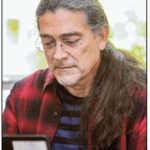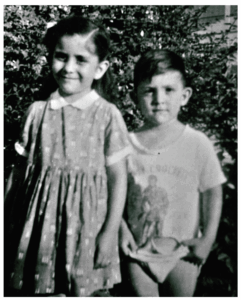Evolving Culture Through JEDI Principles: What Is Your Portal?
Greetings, fellow statisticians. Summer is coming to an end, and, for many, a new academic year is beginning. Alas, the delta variant remains with us. Please be careful, mask up, and get your booster shot (or get vaccinated if you haven’t yet done so). We need you!
I had not anticipated writing a September President’s Corner column, but I am grateful to have the opportunity to again share my thoughts. We are post-JSM, and I thank all for their participation. I immensely enjoyed taping my presidential address and hope my message about the role of self in statistics resonated with you. I was gobsmacked by Vivienne Ming’s insightful and inspiring president’s invited address on messy human problems. For those interested, both presentations should be available for viewing in the near future on the JSM website.
As I write this, I am hours away from giving a presentation to the ASA’s JEDI Outreach Group at their inaugural general body meeting. The Justice, Equity, Diversity, and Inclusion (JEDI) Outreach Group is a community of statisticians and data scientists committed to communication, programming, and professional development that advances and supports a society valuing all people. We should all give thanks to former ASA president Karen Kafader for forming the JEDI group, Julia Sharp for her leadership in getting the group running, Kim Sellers for becoming the first JEDI group chair, and all who have contributed for making this group a reality. The JEDI group represents an exciting milestone in the ASA’s history.
I pride myself in being a member of the JEDI group. The way I see it, we are all “JEDIs” at some level, since we all seek to advance and support a society that values all people (at least I hope we do). Like anything else, becoming a JEDI is not a dichotomy but a matter of degree. To me, being a JEDI is a developmental journey toward being the best professional/manager/researcher/human you can be. And the road traveled requires JEDI principles to guide you.
Everyone has a starting point for their JEDI journey. I like to think mine started around the time I was five years old. There is this picture of me standing with my sister in front of our bungalow in San Antonio, a three-bedroom home to all seven of us. I am wearing this holey Davy Crockett T-shirt and beaming with pride. That shirt—hole in the bottom not withstanding—was my most treasured possession. It featured a character from a TV show in the 1950s by the same name—Davy Crockett. The darn theme song still buzzes in my head when I view the picture: “Davy, Davy Crockett, king of the wild frontier …” By the way, please disregard that I forgot to don pants for the picture. I loved life and playing so much I typically would forget something in my eagerness to get outside and play with whatever was there—insects, cactus, rocks, sticks, neighbors, whatever.
The reason I see this as the starting point of my JEDI journey is because of what the Davy Crockett shirt symbolized: my assimilation into US culture as a second-generation Mexican American. Because both my parents worked, my pre-school days were spent at home with my grandmother listening to Spanish-language radio and music, but the afternoons and evenings were filled with the new technology of the time—black and white television. I was given ‘full doses’ of shows such as Ozzie and Harriett, Lassie, The Rifleman, and, yes, my favorite, Davy Crockett. And I watched cartoons such as Looney Tunes and Popeye. Those shows communicated cultural norms and values I did not realize were having a profound impact on me.
For instance, many of the old cartoons have overtly racist and sexist characters and portrayals of non-whites and females. The cartoons glorify fighting, inflicting pain, making fun of people. They set a standard for what is “funny.” The 1960s only served to reinforce those cultural norms. Suffice to say that by the time I started my first real job in 1982 at Temple University in Philadelphia, I had undergone both assimilation into white US culture and acculturation as I fully embraced my Mexican heritage and Latino culture.
As a young professional, I became quickly aware that I needed to recognize my biases in both my professional and personal lives. And if I wanted to be a better statistician, researcher, mentor, team member, or leader, I recognized I needed to undergo significant personal growth in areas related to JEDI. So much of my life has included self-reflection and attempts to overcome the biases so deeply instilled since childhood.
Over the years, I have made terrible gaffes and repeatedly demonstrated that my JEDI journey is long, hard, and sometimes painful, especially when being brave enough to admit my own shortcomings. As I have discussed in other columns, your personal and professional growth will be meaningful and rewarding if you can allow yourself to be vulnerable and admit to and face your own biases. And, yes, sometimes you find you took two steps forward and a step backward. But that is okay because it is all about striving to make progress.
The ASA’s JEDI Outreach Group can help you in this personal journey. By working with others, you can make a difference in the ASA and its membership, and that can help you at your workplace and in the broader statistical community. Collectively and individually, JEDI members will be modeling behaviors that can create a more open and productive culture. By living our JEDI values, we can help others realize the benefit of a more equitable, just, diverse, and inclusive association and society. In a sense, it is an antidote to the biases that have built up over a lifetime. This can help improve our culture in the ASA and in society.
The JEDI group is a resource we can all embrace as part of our own JEDI journeys. Each of us is a “work in progress” with a different starting point. My starting point was a holey Davy Crockett T-shirt, and I think of that hole as my portal to personal JEDI improvement. Please join our trek. And by the way, what’s your portal?



















